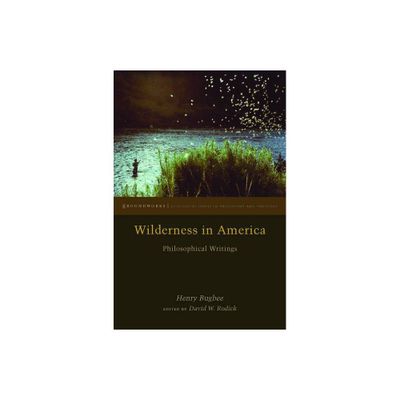Home
Wilderness: Legislation and Issues in the 114th Congress
Loading Inventory...
Barnes and Noble
Wilderness: Legislation and Issues in the 114th Congress
Current price: $19.95


Barnes and Noble
Wilderness: Legislation and Issues in the 114th Congress
Current price: $19.95
Loading Inventory...
Size: OS
*Product Information may vary - to confirm product availability, pricing, and additional information please contact Barnes and Noble
The Wilderness Act of 1964 established the National Wilderness Preservation System and directed that only Congress can designate federal lands as part of the system. Free-standing bills to designate wilderness areas are typically introduced and considered in each Congress; such bills are not amendments to the Wilderness Act, but typically refer to the act for management guidance and sometimes include special provisions. Numerous wilderness bills were introduced in the 112th Congress, but it was the first Congress since 1966 that did not add to the wilderness system. The only wilderness law that was enacted in the 112th Congress reduced the size of a wilderness area. At the end of the 113th Congress, multiple wilderness designations and expansions were included in the National Defense Authorization Act for FY2015 (NDAA) (P.L. 113-291, §§3060-3062, 3064-3066). The NDAA expanded or created wilderness in five states: Colorado, Montana, Nevada, New Mexico, and Washington. Wilderness designation can be controversial. The designation generally prohibits commercial activities, motorized access, and human infrastructure from wilderness areas; however, there are several exceptions to this general rule. Advocates propose wilderness designations to preserve the generally undeveloped conditions of the areas. Opponents see such designations as preventing certain uses and potential economic development in rural areas where such opportunities are relatively limited. Most bills direct management of designated wilderness in accordance with the Wilderness Act. However, proposed legislation also often seeks a compromise among interests by allowing other activities in the area. Pre-existing uses or conditions are often allowed to continue, sometimes temporarily, with nonconforming uses to be halted and/or nonconforming conditions to be rectified. More commonly, the authority is permanent, with limited access permitted for specific areas, uses, and times, or with the authority to operate and maintain pre-existing infrastructure. Wilderness bills often contain additional provisions, such as providing special access for particular purposes, for example, border security. Water rights associated with wilderness designations have also proved controversial; many statutes have addressed wilderness water rights.








![Great Power Competition: Implications for Defense [Annotated]: Issues for Congress](https://prodimage.images-bn.com/pimages/9781608882601_p0_v1_s600x595.jpg)









